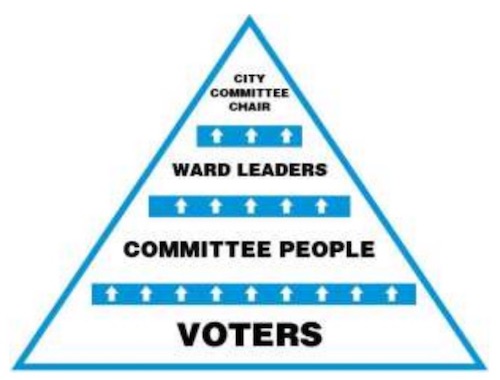Over the last couple weeks, local party organizations across Pennsylvania have been reorganizing and choosing new leadership in the wake of the May 15th primaries, and there have been a few interesting stories out of Allegheny County we wanted to flag, as they highlight some practices Philly’s Democratic Party should think about stealing from their counterparts in Allegheny.
First, the committee people vote directly for the Chair of the Allegheny County Democratic Committee, along with lower leadership positions, rather than empowering ward leaders to vote for the Chair. Jonathan Silver breaks down how it works for The Pittsburgh Post-Gazette:
Challenger Eileen Kelly on Saturday handily defeated incumbent Nancy Patton Mills as leader of the Allegheny County Democratic Committee in a vote carried out by secret ballot, a point of controversy in the days leading up to the election.
Ms. Kelly, the current chairwoman of the Pittsburgh Democratic Committee, won a four-year term at the county level by defeating Ms. Mills by a vote of 609-267 […]
The voting was conducted from 9 a.m. to noon on paper ballots and counted by three pairs of a Democratic Party volunteer matched with an attorney. Credentials were required by voters only to check for eligibility; the ballot itself was anonymous […]
Of the 1,739 eligible voters — including county and state committee members and certain executive positions — turnout appeared to be right around 50 percent.
This matters for a few reasons. While organizing to win a significant share of committee seats is always going to be a challenge, direct committee person votes for the top-level leadership present a much lower barrier to leadership change than the process Philadelphia Democratic City Committee (DCC) uses.
If you want to change the leadership of the DCC now, you need to persuade or replace a majority of the ward leaders, which in practical terms requires a pro-leadership change coalition to win a majority of the committee person seats in a minimum of 35 wards, and then hold all those ward leaders together to vote for an agreed-upon party Chair. Good luck getting a consensus on that! It’s just too high of a bar to clear, and it ultimately makes the Party too insulated and unresponsive to changing preferences in the electorate.
The Allegheny Democrats are having a bylaws convention after the election to debate the secret ballot rule, and possibly other rules—an idea that Philly Democrats should absolutely emulate, since they are still using the 1950’s rules as a baseline, with a few amendments added over the years.
A direct committee person election also holds out the possibility of greater accountability, and a different type of campaign for the top job. With just 69 ward leaders eligible to vote for the Chair in Philadelphia—and very few “open” wards where the ward leader’s vote is bound by a prior vote of the committee people—a party Chair campaign takes the form of a one-on-one persuasion effort to win the votes of just a few dozen people. With a direct committee person election, the Chair candidates would be competing for votes from over 3,000 eligible voters, which would necessarily require a more visible public persuasion effort where the different Chair candidates have to get out and talk more about what they want to do.
Another practice Allegheny County Democrats use that Philly should also adopt is having the secret ballot as the default option for their leadership elections.
This practice may not be long for this world, as the state Democratic Party recently announced in May that secret ballots would no longer be permitted at any level of the party, and committee members would have to sign their ballots going forward. Eileen Kelly, the new Allegheny Democratic Chair, mounted a successful legal challenge to keep this rule from governing this year’s Allegheny County leadership election, but the state-level rule change seems likely to apply to future party elections. Again from The Post-Gazette:
The switch away from secret ballots, Ms. Mills said, was an attempt to increase transparency within the party and hold committee members accountable to their constituents, adding that the decision had nothing to do with Ms. Kelly’s candidacy.
Attorney Jim Burn, who is representing Ms. Kelly, said the party has used secret ballots for as long as anyone can remember. The practice originated from the fact that many committee members once worked for elected officials and feared retribution if their votes didn’t match up with their employers’ candidate preferences.
Even so, a signed ballot is much better than the show-of-hands vote that is the default procedure in Philly’s ward leadership elections. Under the DCC bylaws, committee people vote by show of hands, and a two-thirds vote at the reorganization meeting is required to vote via secret ballot. In several wards in 2018, the outcome of the leadership election outcomes could have been much different if committee people had been able to vote confidentially.
The argument that committee people’s votes should be documented so that they are accountable to their constituents has some merit in theory, but at least in Philadelphia, the vote tally is typically not recorded, and definitely isn’t reported publicly anywhere. Under the circumstances, it’s hard to see how this system results in greater accountability for voters.
Another idea worth looking at from Allegheny is the gender parity policy for committee person elections. Allegheny County Democrats use the same system for committee person seats as the state party does for State Committee, where half the seats must go to women and half to men. Two committee people are elected to each division, same as in Philly, except it has to be one man and one woman. This policy caused some controversy in this year’s State Committee elections after it had the unintended effect of helping Council President Darrell Clarke prevail over some women candidates who received more votes than him in his State Committee race. In general though, it seems like a pretty good idea to start from a baseline of equality.
One important criticism of this policy is that it enshrines a binary conception of gender in the process that could discourage or disadvantage non-binary candidates, but it’s at least worth talking about. One possible workaround might be to limit male candidates to one committee seat.
Lastly, and most importantly, the Allegheny Democrats are having a bylaws convention after the election to debate the secret ballot rule, and possibly other rules—an idea that Philly Democrats should absolutely emulate, since they are still using the 1950’s rules as a baseline, with a few amendments added over the years.
Last year, Governor Ed Rendell called for a party convention to revisit some of the Party’s more anti-competitive practices with the goal of encouraging greater participation, and this continues to be a worthy idea for new committee people to push.
Jon Geeting is the director of engagement at Philadelphia 3.0, a political action committee that supports efforts to reform and modernize City Hall. This is part of a series of articles running in both The Citizen and 3.0’s blog
Photo via Flickr










